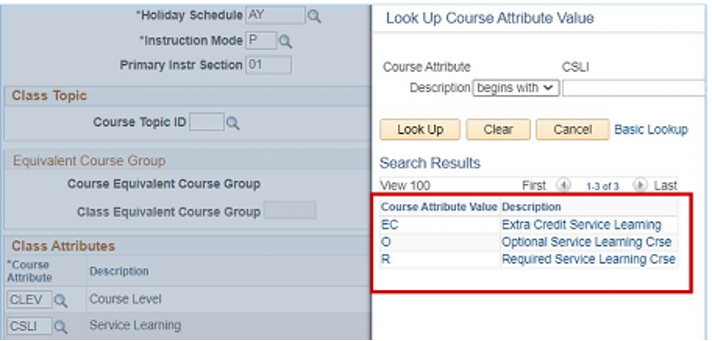The following information is a guide for College Schedulers & Administrative Office Coordinators when attributing course sections per semester. Effective as of the fall 2021 semester, there are new values within Campus Solutions when coding a course section based on the Chancellor's Office guidelines. Campuses are required to use two-course attributes to identify community-engaged and service-learning courses:
- CCEL = Curricular Community Engaged Learning
- CSLI = Community Service Learning
CSLI Attribute - Community Service Learning
In past semesters, the process was to identify and code a course section by using “Y”- yes, this section is CSL. As part of the Chancellor’s Office California’s Call to Service Initiative, a systemwide accountability goal was identified: Strengthen a Sustainable Data Collection Infrastructure to improve comprehensive data collection efforts on service-learning (SL) and community engagement systemwide. The charge by the CO is that all campuses implement a common systemwide service-learning attribute (CSLI) in the student information system to effectively identify and track SL courses.
As a result, the new values in CS are Required (R), Extra Credit (EC), and Optional (O) (see image below).

ICCE will send a friendly reminder to AOCs/Dept. Chair prior to the course scheduler deadline to code any sections as CSL or CCEL each semester.
AOCs/Dept. Chairs should do the following steps with faculty about the following to best assist them in identifying and coding which course sections apply to them for this CSL attribute:
- Confirm with faculty if they teaching/offering a course section as CSL (refer to Master CSL Course List)
- If yes, please identify whether the CSL assignments/projects/activities will be Required (R), Extra Credit (EC) or Optional (O) for students enrolled in the course, where
-
R (required): all students enrolled in the course must participate in CSL activities and complete related assignments. CSL is embedded into the course curriculum.
-
EC (extra credit): enrolled students have the option to participate in some or all CSL activities and assignments and will be awarded extra credit for those activities and assignments.
-
O (optional): enrolled students can elect to participate in CSL activities and complete related assignments OR participate in traditional “classroom” activities and complete related assignments.
-
- AOCs then code section as CSL with attribute value in course scheduler.
As a friendly reminder, the CSLI attribute of a course section is important to ensure that the course instructor will have the ability to record student CSL hours within their SF Gateway Faculty Center at the end of the semester. These recorded hours will appear on their students’ official transcripts.
NEW! CCEL - Curricular Community Engaged Learning
As part of the Chancellor’s Office California’s Call to Service Initiative, a systemwide accountability goal was identified: Strengthen a Sustainable Data Collection Infrastructure to improve comprehensive data collection efforts on service-learning (SL) and community engagement systemwide. The charge by the CO is that all campuses implement a new common systemwide Curriculum Community Engaged Learning attribute (CCELI).
CCELI are identified by as Community-based experiences that enhance course learning, benefit the common good, and take place in collaboration with community partners.
ICCE will send a friendly reminder to AOCs/Dept. Chair prior to the course scheduler deadline to code any sections as CSL or CCEL each semester.
- Confirm with faculty if they teaching/offering a course section as CCEL
- AOCs then code section as CCEL with attribute value in course scheduler.
Per Academic Senate Policy #S22-224, the ability to record student hours is only for CSLI attributed courses, not CCEL.